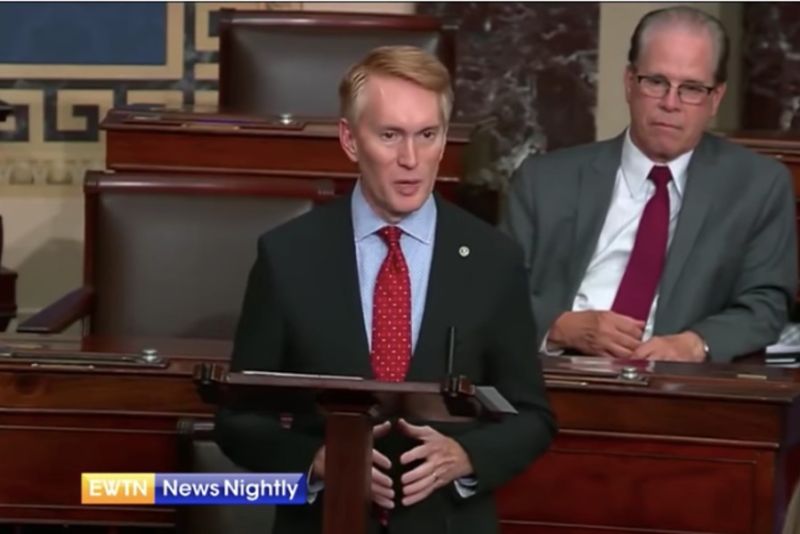Sen. Lankford calls on Republicans to not back down from pro-life stance

 Sen. James Lankford, R-Oklahoma, speaks on the Senate floor in favor of his pro-life amendment. / Credit: “EWTN News Nightly”
Sen. James Lankford, R-Oklahoma, speaks on the Senate floor in favor of his pro-life amendment. / Credit: “EWTN News Nightly” Washington, D.C. Newsroom, Jul 3, 2024 / 16:57 pm (CNA).
Amid rumors that the campaign of former U.S. president Donald Trump wants to remove national protections for the unborn from the 2024 Republican Party platform, top pro-life leaders, including Oklahoma Sen. James Lankford, are calling on Republicans to not back down from their long-standing pro-life convictions.
Here are the latest developments related to pro-life issues across the country.
Lankford on abortion: ‘We’ve got to first win the hearts of people’
Speaking earlier this week on a Students for Life webcast, Lankford said the GOP is “kind of all over the place” on abortion, with many Republicans in the United States Senate backing away from any national pro-life stance out of fear that it’s a losing issue.
During last week’s presidential debate, former President Donald Trump also advanced the idea that abortion should be kept a states’ issue.
“Right now, there are Republicans that are saying this is only a states’ issue, we shouldn’t talk about it on the federal side,” Lankford said. “My push on that is no, this is exactly the time to keep talking about it … The way you win the argument is to keep talking about it, not to talk about it less.”
He urged pro-lifers to contact their representatives and delegates to the upcoming Republican National Convention.
“You don’t win hearts if you don’t talk about an issue,” Lankford said. “So, if we’re going to win votes one day, we’ve got to first win the hearts of people.”
Kentucky judge throws out ‘religious liberty’ lawsuit against pro-life law
A district judge for Kentucky threw out a lawsuit brought by three Jewish women who argued that the state’s pro-life law violates their religious liberty right to obtain abortions.
Jefferson Circuit Court Judge Brian Edwards issued the ruling last Friday.
The women — Lisa Sobel, Jessica Kalb, and Sarah Baron — had argued that Kentucky’s law protecting human life from conception violates the state’s Religious Freedom Restoration Act. Edwards, however, found they lacked standing and dismissed the case without weighing into the merits of their argument.
Though dismissing this case, Edwards left room for future religious liberty arguments against the pro-life law. He wrote: “The court does acknowledge serious concerns regarding the substantive constitutionality of KRS 311.772 [Kentucky’s pro-life law], and these questions will ultimately need to be revisited and addressed by the Kentucky Supreme Court.”
Arizona abortion supporters submit signatures for new amendment
A group called Arizona for Abortion Access officially filed paperwork with the state to put a broad abortion amendment on the ballot this November.
The group said on Wednesday that it had reached 823,685 signatures, well over the 380,000 required to add a ballot proposal in the state. Now, state officials must verify the signatures before adding the measure to the November ballot.
If passed by voters, the amendment would enshrine a “fundamental right” to abortion. The measure would prohibit any restrictions or interference with abortion before viability or after viability when determined by a health care professional to be necessary to protect the life or physical and mental health of the mother.
Currently, abortion is legal in Arizona until 15 weeks of pregnancy.
Wisconsin Supreme Court greenlights lawsuits against pro-life law
The Wisconsin Supreme Court greenlighted two lawsuits against the state’s law protecting life at conception.
The suits, filed by Planned Parenthood of Wisconsin and Wisconsin Attorney General Josh Kaul, argue that abortion is guaranteed by the state constitution.
In a narrow 4-3 decision issued on Tuesday, the state’s high court agreed to hear the case. In a concurring opinion, state Justice Jill Karofsky wrote: “This court is doing what many other state courts have done, both before and after Dobbs v. Jackson Women’s Health Org., 597 U.S. 215 (2022) — considering a state constitutional challenge to an abortion-related statute. Deciding important state constitutional questions is not unusual — it’s the court’s job.”






